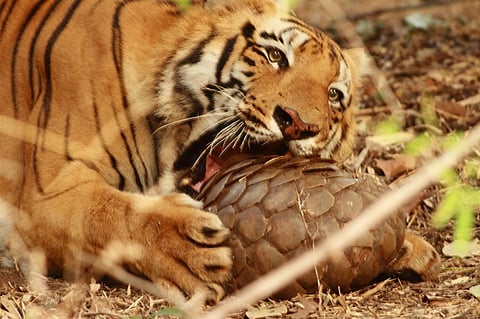

It is World Pangolin Day today—dedicated to one of the most adorable and yet the most cruelly treated animals in the world.
Globally, there are eight species of pangolin distributed across the continents of Asia and Africa. The four found in Asia are the Indian Pangolin, Philippine pangolin, Sunda pangolin and Chinese pangolin while the African pangolin species are black-bellied pangolin, white-bellied pangolin, giant ground pangolin and Temminck’s ground pangolin.
Credit: Environmental Investigation Agency
The situation of all pangolin species remains grim due to the multi-million dollar illegal trade in their meat and scales, prized in East and Southeast Asian nations. Due to epidemic poaching, the populations of Asian pangolin species, including the Indian Pangolin (see Interview below) are now mostly classified by the International Union for the Conservation of Nature (IUCN) as either “Critically Endangered” or “Endangered”. This has caused poaching and trade to shift significantly to Africa and the African species are all listed as “Vulnerable”. In light of this and the continued threat posed by the illegal trade, all eight pangolin species were uplisted to Appendix I at the most recent Conference of the Parties to CITES, in South Africa in September 2016.
|
“The situation is dire”
What is the current status of the Indian Pangolin? It is very dire. There are a lot of things that remain to be done. Law enforcement in India has to gear up and improve their understanding of the pangolin trade, understand the routes, the uses, the destinations and markets to which pangolin meat and scales are headed to, develop intelligence network, set up intelligence units and be able to take very quick action based on intelligence. All of this is lacking. In India, the Forest Department is mainly responsible for tackling poaching and trade. They are not very-well equipped. A lot of positions remain vacant. In most frontline positions, very old staff is posted. There is no coherent policy on part of the department to understand the phenomenon of pangolin poaching and take effective action. We have a long, long way to go. Where are Indian Pangolins placed with regard to the latest CITES listing? Indian Pangolins are listed as “Endangered”. And the listing cannot fully explain the exact ground situation of the Indian Pangolin. Most seizures of pangolin scales in India tell us that the poaching has started targeting babies and juveniles as the adults have already been poached. This could be very dangerous as it could depress the population and cause local extinction in certain places. The ideal strategy now is to make an assessment of the total pangolin population across India, designate their main habitats and secure those areas. We also require very strong prosecution, which would end in real conviction. Usually, what happens is that poachers who get arrested after seizures of scales end up in jail, pass their jail sentence and return to their poaching habits. What is needed is real deterrence so that they never indulge in this activity again. What is the estimated population of Indian Pangolins right now? That is not known. Very small surveys, at district-level or division –level have been attempted, but that has also been done in a mostly unscientific manner. That is the biggest lacuna because we do not have an estimation of the exact population of Indian Pangolins. Where are Pangolin scales and meat from India usually headed for? China, Vietnam, Korea, Taiwan. And we have also come across reports that party circuits in Chicago and New York are using pangolin scales in illegal drug concoctions. |